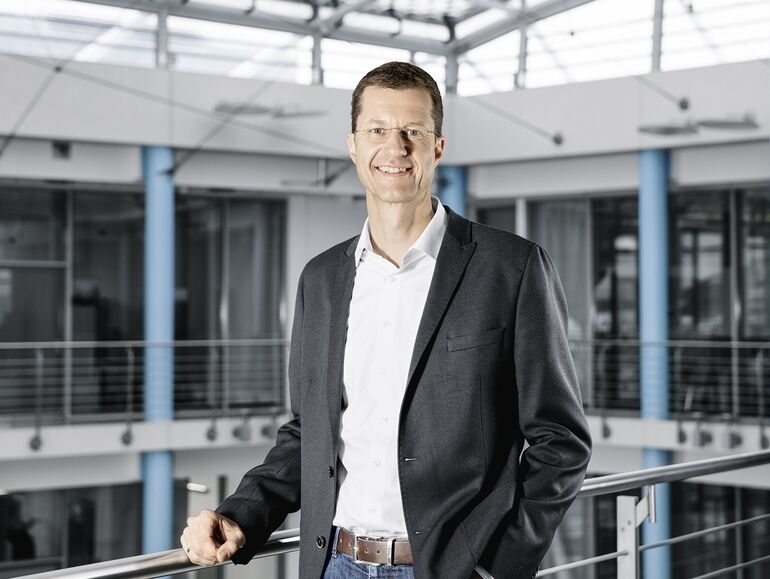Mr Schulz, you have been focusing on process technology for some time. What do you find so exciting about this particular topic?
Thomas Schulz: In my view, process technology should be much better at selling itself and present itself in a more fascinating way so that more young, talented people with creative minds become involved in this topic and research and development in this area is stepped up and advanced more quickly. Personally, I find process technology interesting primarily because very many everyday products and commodities can be made from just a few raw materials. I think consumers today are hardly ever aware of how exciting the production process of the products on the shelf is.
Your speciality is biologisation. Will biotechnological processes soon replace classical chemistry?
Schulz: I wouldn‘t put it quite so blatantly, but yes, I think biotechnological alternatives will replace many classic chemical methods. Processes that have so far been based on fossil raw materials will soon be replaced by environmentally friendly processes. Microorganisms and enzymes from renewable resources will sustainably produce products that have so far been artificially synthesised with a huge input of energy and materials.
Can you give us some examples of such forward-looking biotechnological processes?
Schulz: We humans have been using the oldest biotechnological processes for thousands of years to produce bread, beer and wine. Yeast cultures were and are still used for this. Biotechnology for production is already firmly established in the pharmaceutical industry for manufacturing biopharmaceuticals – as opposed to small molecules. Many APIs (active pharmaceutical ingredients) can now be synthesised using biotechnological methods. However, there are also many new approaches. At Festo, we are active in, among others, the Innovation Alliance for Functionally Optimised Biosurfactants whose aim it is to advance sustainable alternatives to chemically synthesised surfactants based on fossil raw materials. We are working together with our partners – universities, research institutions and other renowned companies – towards the goal of developing bio-based surfactants for a wide variety of applications and requirements and the cost-effective automation of production. For example, non-foaming biosurfactants for use in dishwashers or highly foaming surface-active substances for shampoos.
What is the biggest challenge in implementing these new biotech processes?
Schulz: The common chemical processes – many of which are based on petrochemicals – are well established and optimised in terms of process technology. Only a small amount of material waste is generated in production. Most of the intermediate products are used as feedstocks in other processes. The procedures can be carried out relatively cheaply, apart from the currently rising energy costs. The processes in chemical production are known well enough and can be optimally controlled. Many biotechnological processes, on the other hand, have not yet been extensively researched and the processes in the fermenters in the pharmaceutical, food and cosmetics industry are not fully known.
And apart from that?
Schulz: Since biotechnological production is aligned with a pioneering industry – in this case the pharmaceutical industry – pharmaceutical standards currently apply in many places. And anyone who knows anything about the pharmaceutical industry knows how incredibly demanding the requirements are, and that this drives up the costs significantly in plant construction and production. One goal in the biologisation of processes must therefore be to reduce plant, process and production costs. In addition, ways must be found to optimally utilise by-products from biotechnology. We therefore need integrated biotechnological production sites, as is common in the chemical industry.
What would be an example of the further utilisation of by-products?
Schulz: A good example is insect protein. Insects are reared in part to obtain protein for various applications. In addition to proteins, fats and chitin are also produced. The pressed fat could, for example, be used for producing biodiesel or for producing the above-mentioned biosurfactants. However, this is not yet common practice and the appropriate processes have not yet been implemented in the industry.
You mentioned the standards and requirements of the regulatory authorities. For example, the Novel Foods Regulation stipulates that novel foods must be subjected to a health-related evaluation before they can be placed on the market. In addition, other standards, for example from the pharmaceutical industry, still apply in some bases because there are as yet no other specifications.
Schulz: We don‘t yet know which guidelines will be applied and from what point on the processes have to meet the relevant standards. For example, it is possible to obtain omega-3 fatty acids from algae oil instead of fish. However, it is not specified at what point the process must comply with existing food standards. Should the production of the algae themselves, which produce the algae oil, already comply with the measures and concepts for food production, or is this only sensible once the oil has actually been processed? The regulatory authorities must find practical solutions as quickly as possible.
Many biotechnological processes are not yet economically competitive. A large proportion of the bioreactors and fermenters offered on the market meet the requirements of the pharmaceutical industry. What solutions are you relying on at Festo to find the most cost-effective ways to biologisation?
Schulz: A mass flow controller for use in pharmaceutical production costs up to four times as much as a mass flow controller for controlling gas in non-pharmaceutical processes. This is not because the component for the pharmaceutical sector is technically significantly different, but rather because the requirements are high and the effort involved in carrying out audits and quality management and obtaining certificates is very costly. In any case, it is our aim at Festo to find factory automation solutions for biotechnology that are both inexpensive and meet good quality standards and have a long service life at the same time. We are a forward-looking company.
Speaking of the future: So in your opinion, biologisation is the technology of the future?
Schulz: Yes, I think biotechnology will take over market share in the chemical industry as well as in the food industry. In my view, biologisation is an important part of the solution to keep the earth livable even as world population grows. The circular economy is also no longer a „nice to have“. Instead of always using fresh raw materials, it is essential that we recycle used materials.
And why is it time for biologisation right now?
Schulz: Because we now finally have the necessary IT capacity to go the distance. Do you remember the Human Genome Project? The objective was to completely decode the human genome. The international research project started in 1990 and cost many billions. The human genome with its almost 20,000 genes has only been fully decoded since May 2021. Today, more than 30 years after the project was launched, we are able to sequence the gene code of a microorganism with a large number of base pairs at a manageable cost within hours. One of the reasons is that we now have enormous IT computing power and are supported by AI systems. In the future, these AI solutions will also support us in monitoring and controlling the processes in our bioreactors. Until now, we have often worked according to the trial-and-error principle in biotechnology.
Short profile Thomas Schulz
Thomas Schulz has been working in the process industry for over 20 years. As Industry Segment Manager at the automation specialist Festo in Esslingen, the industrial engineer is responsible for business development in the biotech, pharmaceutical and cosmetics sector.
Author: Jasmin Qaud-Taher, Freelancer for process-technology-online.com
Hier finden Sie mehr über:











